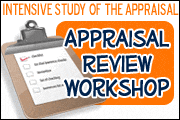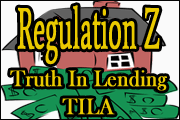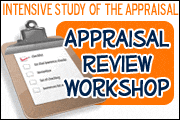Appraisal And Tax Return Analysis Training Courses |
Best-Selling Training Courses:Online Training Courses Instructor-Led: Webinars |
Appraisal And Tax Return Analysis Training CoursesThe Importance Of Appraisals And Tax Return Analysis For Lenders
As learned from the 2007 real estate crash, proper valuation of both the property and the buyer's ability to pay the mortgage is key to a successful loan.
As such, included below are several Appraisal And Tax Return Analysis training courses to help you ascertain whether you are making a good loan. Simply click the applicable course title to learn more about each course.
>>> Appraisal Training Courses
There are many new and updated real estate appraisal and evaluation rule and regulations, including revised Interagency Guidelines, new rules under Reg. Z, and additional requirements due to Dodd-Frank.
There also are restrictions against using Automated Valuation Models, Broker Price Opinions, and tax valuations.
Our Appraisal training courses go in-depth on the details of the appraisal and valuation process from both the lender's and appraiser's perspectives to provide a thorough understanding of what is required. Here is just some of what you will learn:- Mortgage regulations under Reg. Z
- Regulations and Interagency Guidelines
 - The many forms of appraisals and evaluations - what can you use and when?
- Dealing with "re-addressed" and "transferred" appraisals
- Anti-coercion and undue influence provisions of Reg Z - what can you NOT do or say?
>>> Tax Return Analysis Training Courses
Why Do Mortgage Lenders Need Tax Returns?
Tax return analysis for lenders deals primarily with income verification, because analyzing proper valuation of both the property and the buyer's ability to pay the mortgage is key to a successful loan.
Today, mortgage lenders want to look at tax returns to verify the borrower's income to ensure that the borrower can repay the loan because tax documents give lenders proof of sources of income and tell them how much of that income is loan-eligible.
According to the Consumer Financial Protection Bureau (CFPB), the Ability-To-Repay and Qualified Mortgage (QM) Rules "generally require creditors to make a reasonable, good faith determination of a consumer's ability to repay any consumer credit transaction secured by a dwelling".
Our Tax Return Analysis training courses provide detailed instruction on all tax return forms and schedules, the required income calculation formulas, and completion of the Fannie Mae Cash Flow Analysis Form 1084. Here is just some of what you will learn:- Personal & Business Tax Return Forms and Schedules
 - Income Calculation Formulas
- The definitions of "Self-Employment"
- Self-Employment Income Guidelines
- Cash Flow Analysis Form 1084
- Comparative Income Analysis Form 1088
- P&L Statement and Balance Sheet Review
- Self-Employment Case Study and Practice Exercises
Find Appraisal And Tax Return Analysis Training CoursesTo find Appraisal or Tax Return Analysis training courses, either select from the 'Recommended Courses' or use the search box below. |
Best-Selling Training Courses:Online Training Courses Instructor-Led: Webinars |
Find Seminars, Webinars, And Online Training In Your Area |
Lending Training - FHA
An FHA loan is a type of government-backed mortgage insured by the Federal Housing Administration, a branch of the U.S. Department of Housing and Urban Development, or HUD. FHA borrowers pay for mortgage insurance, which protects the lender from a loss if the borrower defaults on the loan.
More Details: MortgageTrainingCenter/FHA_Training.asp - VA

The VA - short for the Veteran's Administration - provides mortgage loans made through VA approved lenders. The properties these loans service are single family and multi-family homes, as well as manufactured homes and hospitals. With the increase in VA loan possibilities, VA loan processing is a vital piece in getting your loans to the closing table - but you'll need to know how to market and process this type of loan.
More Details: MortgageTrainingCenter/VA_Training.asp - Conventional
A conventional loan, also known as a conforming loan, is a mortgage that is not guaranteed or insured by a government agency such as the Federal Housing Administration (FHA) or the Department of Veterans Affairs (VA). Conventional mortgages are "plain vanilla" home loans. They are typically fixed in their terms and rate, and follow fairly conservative guidelines.
More Details: MortgageTrainingCenter/Conventional_Loan_Training.asp - Commercial
By taking one of our commercial loan training courses, you will learn about the entire loan process by which a commercial real estate loan is marketed, underwritten, approved, documented, closed, and monitored. You also will learn about the various documents typically found in a commercial loan transaction - and their legal impact on the relationship between the bank and its borrowers and guarantors.
More Details: MortgageTrainingCenter/CommercialMortgageBrokerTraining.asp - TRID/TILA/UDAAP
There are several governmental rules and regulations covering mortgage loans. Some of these include Regulation Z, which implements the regulations behind the Truth in Lending Act (TILA) and Unfair Deceptive or Abusive Acts and Practices (UDAAP). The Mortgage Training Center offers several TRID, TILA, and UDAAP training courses that help mortgage professionals to better understand and comply with their requirements.
More Details: MortgageTrainingCenter/TRID_TILA_And_UDAAP_Training_Courses.asp - Appraisals/Tax Return Analysis
Our Appraisal training courses go in-depth on the details of the appraisal and valuation process from both the lender's and appraiser's perspectives to provide a thorough understanding of what is required.
More Details: MortgageTrainingCenter/Tax_Return_Analysis_Training.asp
 - Loan Processing
While Loan Officers are responsible for generating loan business and taking the initial loan application, Loan Processors typically do the hard work of double checking the paperwork, correcting any errors, and corresponding with the underwriter to make sure the loan is approved.
More Details: MortgageTrainingCenter/Loan_Processor_Training.asp - Underwriting
There are many steps and mortgage documents required to "close" on a loan. Mortgage underwriting is the final step, and is the process the lender uses to access risk and ensure a borrower meets all of their requirements for a loan.
More Details: MortgageTrainingCenter/Mortgage_Underwriter_Training.asp
- Compliance Checklists
Get "Best Practice" suggestions, reminders, and checklists that apply to residential or commercial loans.
More Details: MortgageTrainingCenter/Compliance-Checklists-For-Lenders.asp"
|
Related Links Appraisal Analysis & Requirements Training, Appraisals And Tax Return Analysis |
Share on Facebook
Share on Twitter |

